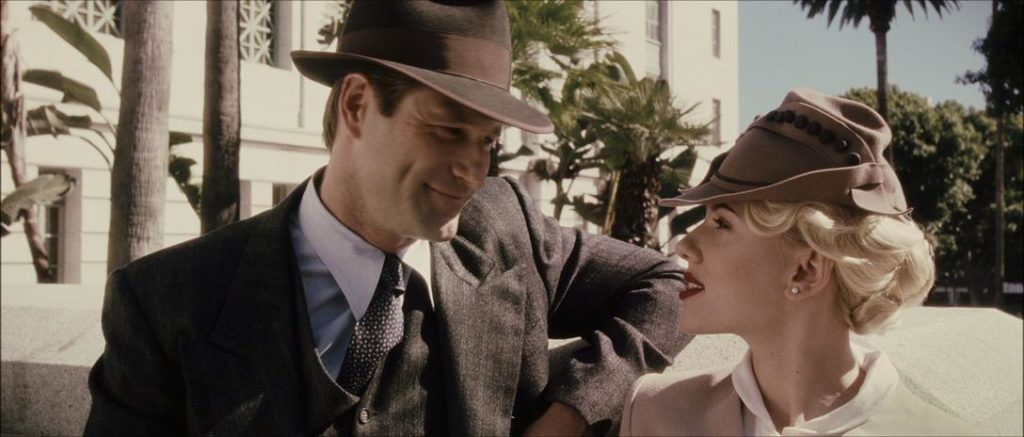The Forgaughtens: The Black Dahlia (2006)

The Black Dahlia is what happens when a master director’s stunning vision gets reigned in or knocked off course by a screenplay that demands too much from him. There are moving images that Brian De Palma and his team conceived of and constructed throughout this film that literally took my breath away – three friends standing in the California sun, a lower class man entering the home of an obscenely wealthy family.
But the actual story, which is something I don’t always care about, is so murky and exhausting. It’s unclear what anyone’s motivations are. The central mystery of the film is something our protagonists obsess over one minute and something the film sweeps aside the next. And as much as I enjoyed Josh Hartnett in my last forgaughten – Lucky Number Slevin – he’s not capable of leading this film, and most of the rest of the cast falls similarly short.
The film chronicles a fictionalized version of the 1947 real life murder of a young aspiring actress named Elizabeth Short (Mia Kirshner). Investigating the case are two famous LAPD detectives – Lee Blanchard (Aaron Eckhart) and Dwight “Bucky†Bleichert (Hartnett), a.k.a. Fire and Ice. They’re the cops that other cops want on the front pages. They have a big boxing match to raise their profile and get sent wherever their superiors think there will be cameras. Of the two, Blanchard is the real star – the guy who can become Commissioner one day. Bleichert is his more reluctant sidekick who tags along to help keep his sick immigrant father comfortable.
Short’s murder captures the public’s attention like nothing else, and Fire and Ice are all over it. But their respective personal lives start to creep in and cause problems. Blanchard appears to be infatuated by Short, and it starts to affect his relationship with his girlfriend, Kay Lake (Scarlett Johannson), who has a sordid past of her own that bleeds into this case in dramatic and eventually deadly ways. Bleichert, meanwhile, strikes up a relationship with a lead in the Short murder – Madeleine Linscott (Hilary Swank), who comes from a very wealthy family and knew Elizabeth from a nightclub they danced at and looks an awful lot like the deceased.
The two things The Black Dahlia is best known for are getting Brian De Palma thrown out of Hollywood and its jaw-dropping cinematography. I talked a little about the latter up front, but it bears repeating – this film is gorgeous. It’s not just the way scenes are lit and constructed, but De Palma also uses Vilmos Zsigmond’s camera to shift between first- and third-party perspectives. That’s not necessarily novel, but the way it’s employed here grants greater thematic weight to what’s otherwise a pretty trashy detective story.
In terms of De Palma’s Hollywood exile, it was probably a long time coming, but I’ll forever feel like this film’s failure wasn’t his fault. The Black Dahlia would be excruciating without his visual and thematic flourishes, and it is excruciating when the screenplay demands that he moves things along. (This is particularly notable in the film’s final act, which approaches “so bad it’s good†territory but doesn’t quite get there.) I always think I like this film more than I do after I watch it because De Palma’s contributions are notable, and I’m inherently sad that he doesn’t have a mid- to high-budget film coming out every couple years.
The film’s cast also lets it down. Hartnett is rough, and Swank is worse. Eckhart doesn’t have much to do, and Johannson is pretty meh. The film’s standout, actually, is Mia Kirshner, who only appears in archival footage, but she makes her fleeting moments count.
Give this film a look if you’re really into De Palma and/or stylized 40s melodrama. It’s not half bad as a curio, but it’s nowhere near the film it could have or should have been with a master director at its helm.
Verdict: Exactly the correct amount of forgotten.













